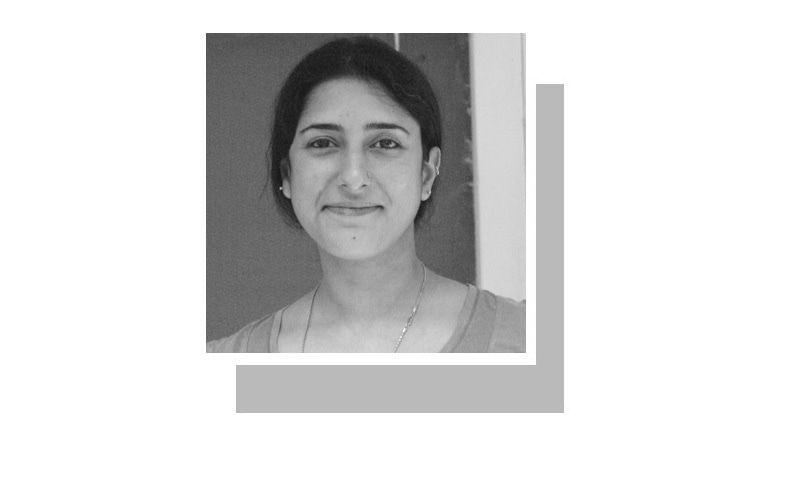
A RECENTLY released Pakistani film is coming under intense criticism from some quarters. Not only is it deeply misogynistic, these viewers argue, it reinforces the worst aspects of patriarchy and gender inequality, and the harassment of women at the hands of men. According to these critics, it even justifies violence against women and despicable forms of behaviour such as stalking.
I haven’t seen the film, so I should not say anymore about it. However, this is hardly the first media effort put forth that has come under varying degrees of criticism on the grounds of having an anti-women bias. Across our television and cinema screens, examples are available: wives being beaten, women as victims, tears and male aggression. Often, this is tacitly or openly justified on that basic, grotesque, trope of patriarchy: the female’s ‘duty’ to silently submit, or face abuse.
Indeed, in the tradition of subcontinental film, there is an established track of harassment: man approaches woman (his right), woman walks away (her right), man keeps chasing her (harassment). More often than not, such film tracks end with the woman eventually being ‘won’; whether her reserves of strength have been worn down through being harassed or she actually changes her mind depends on your point of view.
Curiously enough, some of these problematic productions see participation by women who are at a personal level strong, path-breaking and feminist. Why would they not strive to break the generally anti-women status quo that is quite obviously Pakistani society’s condition?
Do media producers have a duty to effect positive change?
What such people’s (for men aren’t to be absolved of responsibility either) motivations are cannot be speculated upon. But there is a reverse argument to be made. It could be argued that the sort of television and cinematic fare Pakistanis are offered is a reflection of the reality of many, many women across the country. The scriptwriter of the sort of plotline outlined above may defend himself by saying that in general, women in Pakistan suffer — and overwhelmingly, they suffer silently. In this view, the tales of tragedy that play out across the screens are holding a mirror to reality and inviting sympathy for the women.
A completely oppositional plotline, it could be argued, would involve strong female characters who assert their autonomy, and male characters that are gender-sensitive and positive role-models. This is quite far from Pakistan’s baseline markers. Such a production would expose itself to criticism of being divorced from reality and living in a utopia that has little to offer in terms of resonance with the viewers.
So do media producers have a responsibility to effect positive change? Is it expected and incumbent upon them? The answer would be ‘yes’ and ‘no’. Artistic freedom includes the right to choose any topic under the sun, negative or positive, weird, disturbing or life-altering. The artist must follow his own inclination whether it is Silence of the Lambs or Sophie’s Choice or Gone with the Wind.
Yet, on the other hand, the answer would also be ‘yes’ because as thinking, responsible members of society, each person does bear the responsibility of doing what he can to take it in a positive direction. And, further, the power of the media is immense. What is shown on the screens, particularly given how much screen-time the average middle-class family anywhere in the world gets, can change, to use that old cliché, hearts and minds and eventually, societies. And that’s why, it is important that where productions such as The Rocky Horror Picture Show or Final Destination exist, which can be taken as the creators’ self-indulgence, there are others such as Dead Poets’ Society or The Green Mile, which have helped changed attitudes and emotions.
One way to achieve this sort of balance, the push towards progressiveness, could be through picking up on trends or practices that are indeed present in a society and presenting them onscreen in such a manner that they are reinforced in the public hive-mind. At the same time, it is possible to ‘otherise’ the negative elements, even if they are dominant.
In other words, perhaps it is true that many if not most of Pakistan’s women suffer in some way at the hands of men. But not every woman. There are fathers and husbands that don’t force their will on others, there are women who work and prosper and are heads of their families. Focusing on such trajectories onscreen would help normalise them.
Similarly, it may be that many men beat their wives. But portraying such behaviour as problematic, singling the perpetrator out as an aberration that is to be shunned, may well stay a hand or two, and then more and more.
It is in the power of the media, particularly if it is fictional, to dream of and portray the world as it should be, thus paving the grounds for making it so.
The writer is a member of staff.
Published in Dawn, August 14th, 2017











































